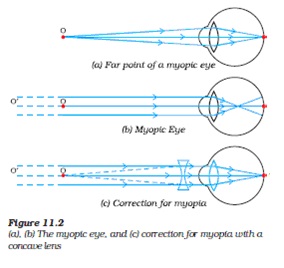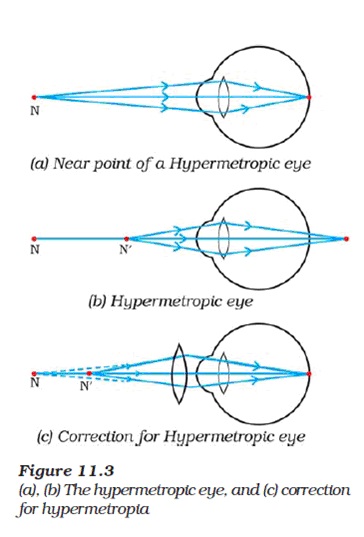Sometimes, the eye may gradually lose its power of accommodation. In such conditions, the person cannot see the objects distinctly and comfortably. The vision becomes blurred due to the refractive defects of the eye. There are mainly three common refractive defects of vision. These are (i) myopia or near-sightedness, (ii) Hypermetropia or far – sightedness, and (iii) Presbyopia. These defects can be corrected by the use of suitable spherical lenses. We discuss below these defects and their correction.
(a) Myopia

Myopia is also known as near-sightedness. A person with myopia can see nearby objects clearly but cannot see distant objects distinctly. A person with this defect has the far point nearer than infinity. Such a person may see clearly upto a distance of a few metres. In a myopic eye, the image of a distant object is formed in front of the retina [Fig. 11.2 (b)] and not at the retina itself. This defect may arise due to (i) excessive curvature of the eye lens, or (ii) elongation of the eyeball. This defect can be corrected by using a concave lens of suitable power. This is illustrated in Fig. 11.2 (c). A concave lens of suitable power will bring the image back on to the retina and thus the defect is corrected.
(b) Hypermetropia

Hypermetropia is also known as far-sightedness. A person with hypermetropia can see distant objects clearly but cannot see nearby objects distinctly. The near point, for the person, is farther away from the normal near point (25 cm). Such a person has to keep a reading material much beyond 25 cm from the eye for comfortable reading. This is because the light rays from a closeby object are focussed at a point behind the retina as shown in Fig. 11.3 (b). This defect arises either because (i) the focal length of the eye lens is too long, or (ii) the eyeball has become too small. This defect can be corrected by using a convex lens of appropriate power. This is illustrated in Fig. 11.3 (c). Eye-glasses with converging lenses provide the additional focusing power required for forming the image on the retina.
(c) Presbyopia
The power of accommodation of the eye usually decreases with ageing. For most people, the near point gradually recedes away. They find it difficult to see nearby objects comfortably and distinctly without corrective eye-glasses. This defect is called Presbyopia. It arises due to the gradual weakening of the ciliary muscles and diminishing flexibility of the eye lens. Sometimes, a person may suffer from both myopia and hypermetropia. Such people often require bifocal lenses. A common type of bi-focal lenses consists of both concave and convex lenses. The upper portion consists of a concave lens. It facilitates distant vision. The lower part is a convex lens. It facilitates near vision.
These days, it is possible to correct the refractive defects with contact lenses or through surgical interventions.
To get study material, exam alerts and news, join our Whatsapp Channel.
